|
With the three
statement plays Fugard experimented with improvisation
together with actors John Kani and Winston Ntshona and
came up with some of his most powerful work. These plays
directly attack the apartheid laws of South Africa at
that time.
"These works avoid the pitfalls
of didacticism, a real danger because of their subject matter (the
"pass" law and the political prison on Robben Island, respectively) by
transforming the real social ordeal of the doubly real people- the
actors and their roles- into artistic and therefore meaningful
structures" (African Literatures in the 20th Century, General Editor
Leonard S. Klein).
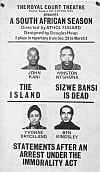 Sizwe Bansi is Dead 1972
Sizwe Bansi is Dead 1972
"Good. Let me just take your name
down...What is your name? Your name please! Come on, my
friend. You must surely have a name".
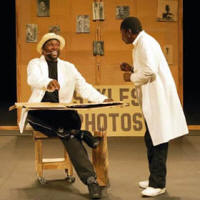
Sizwe Bansi (in the original
title Sizwe Banzi) can only gain work and survive by
taking on a dead man’s identity. The play was
based on improvisations by Fugard, John Kani and Winston
Ntshona who performed at The Space in Cape Town.
Nina Shengold says: John Kani, playing the South African
township photographer Styles, began the play with a
tour-de-force 20-minute monologue. I don't think I moved
from the moment he opened his mouth. He spoke straight to
the audience, recounting his years as a toadying factory
worker before he had scraped up enough money to open the
tiny photographer's studio he called "a strong room
of dreams" for his people. He described some of the
dreamers he'd photographed. Then, without warning, he
looked into the audience, into the front row, at me, and
reached out his hand, inviting me onto the stage for a
closer look. Ears burning with shyness, I shook my head.
I didn't deserve to be on the same stage with this actor.
I was a phoney, a high school fake. Kani beckoned
again, "Come. Take a look." The middle-aged man
next to me whispered, "Go on." And somehow, I
did. I took hold of Kani's hand, clambered over the
footlights and floated across the stage in a humming fog
of excitement. I don't remember any of the photographs he
showed me, but I'll never forget Kani's face, the burn of
his eyes and the sweat on his skin as he begged me to
look. The play was rated number 59 on
the Royal National Theatre's most significant plays of
the twentieth century, equal with Murder In
the Cathedral by TS Eliot.
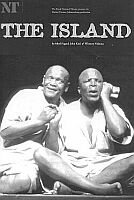 The Island 1973 The Island 1973
"When you get in front
of them, sure they'll laugh...Nyah! nyah!...they'll
laugh. But just remember this brother, nobody laughs
forever! There'll come a time when they'll stop laughing,
and that will be the time when our Antigone hits them
with her words"
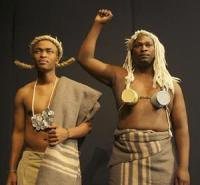
Two prisoners on Robben Island prison
camp rehearse a performance of Antigone. One discovers he
will shortly be released, the other is a lifer, so there
is a meeting of hope and despair. The harshness of the
camp is conveyed in long mime sequences. The
relationship between the prisoners reminds me of the two
brothers in Blood Knot. Another comparison is Jean
Genet's Death Watch. The premiere was in the Space
Theatre in Cape Town with Fugard directing Kani and
Ntshona. The title was given as Die Hodoshe Span since
any references to Robben Island prison camp would be
unacceptable to the government. The play was
revived in London in February 2000 with Kani and Ntshona
and Fugard acting. It played to full houses in the Royal
National Theatre with both actors demonstrating their
towering acting abilities.
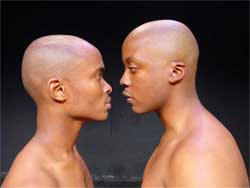
John Kani says (quoted in The
Crossings Project): What we discovered after creating
Sizwe Bansi was that we couldn’t have the text
written down. This was because it would have been a
document; it would have meant that the police would have
evidence that could be presented to a District Attorney
who might lay charges against us. So we kept continuing
to improvise according to the interactions and response
with the audience. That way we used our life experience,
structured it around a story, to take the audience on a
journey through to the end of the evening. After
Sizwe Bansi Is Dead, we decided to explore the subject of
Robben Island. To start off with, we put a blanket on the
ground. We stood on it and began to move with Athol
watching. We began to halve the blanket, halve the
blanket, until there was just enough space for four feet
to stand. We realised the restriction of space, and there
it was – confinement. And there it was –
prison.
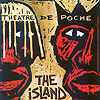
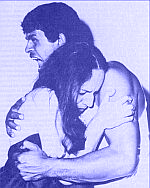 Statements after an Arrest
under the Immorality Act 1972
Statements after an Arrest
under the Immorality Act 1972
"If you're going to dream,
give yourself five rooms man"
"Do you ever do that? Imagine that what you've got
in your pockets is all you've got, but really all you've
got. No family, no place to go, nothing to do, just
standing suddenly in Church Street with forty-three
cents...and then try to work out what you would do with
it"
Two lovers lie together and talk.
The police enter and arrest them, as one is white the
other coloured. They each are forced to give
statements. Fugard directed himself and Yvonne
Bryceland in the premiere in Cape Town in 1972. In London
Fugard directed Ben Kingsley in his role.
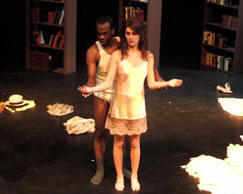
Corin B. Self and Courtney Weber in Run of the Mill
Theater's production directed by Jenny Tibbels.
|